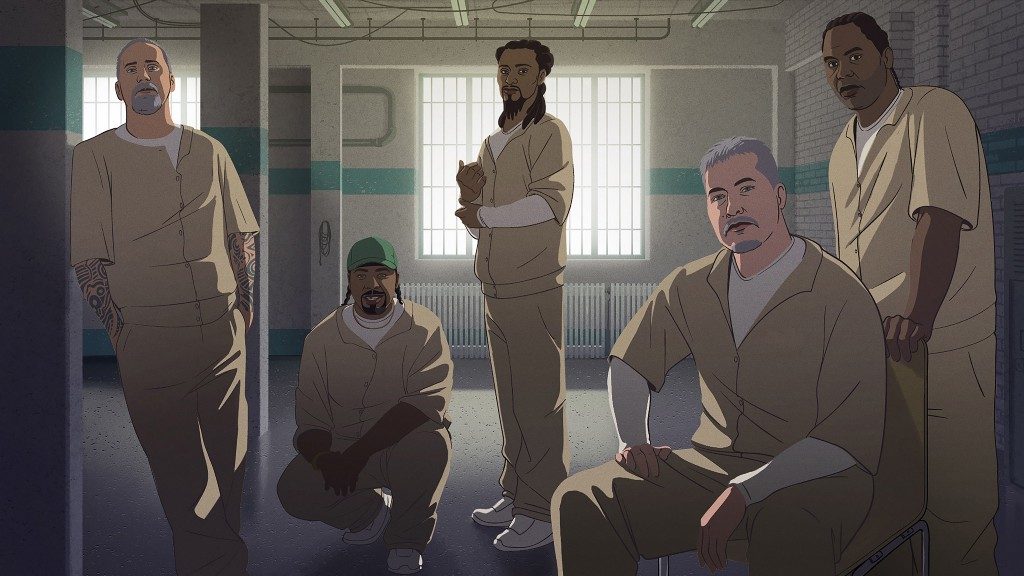Madeleine Sackler is an Emmy-winning director and producer whose credits include “The Lottery,” “Dangerous Acts Starring the Unstable Elements of Belarus,” and a second upcoming Tribeca premiere “O.G.”
“It’s a Hard Truth Ain’t It” will premiere at the 2018 Tribeca Film Festival on April 25. The film is co-directed by 13 men incarcerated at the Pendleton, Indiana Correctional Facility.
W&H: Describe the film for us in your own words.
MS: The film is a collaboration with 13 men who are currently serving time in a maximum-security prison in Indiana, and the film unfolds as we discuss and learn about filmmaking in order to tell the story of how they ended up in prison.
W&H: What drew you to this story?
MS: When we started meeting together to talk about filmmaking and the group started learning how to use the camera, we really had no idea that it would turn into a feature film. But as we watched films together, the group couldn’t help but apply the storytelling techniques to their own lives.
How would they use different narrative devices — interviewing, animation, lower thirds, narration — if they were making their own film? What story would they want to tell? Why would an audience want to see it?
I love films that break from traditional narratives, and so I loved the idea of making a film as a group with no objective other than to see where our creativity took us. It was so freeing to let it unfold.
W&H: What do you want people to think about when they are leaving the theater?
MS: I hope that people think about the complexity of what lands someone in prison, and that if we look deeper than the crime, and try to understand the crime and how that person got there — only then will we find the keys to prevent crimes from happening in the future. Warehousing people without talking to them, without looking at the patterns of how violence comes to pass, is simply not working.
Our high rate of recidivism in comparison to countries that don’t put anyone in a cage, like Germany, is proof of that. Aside from prison, I hope the film shares the joy and curiosity that all of us felt working together, and how much you can gain and learn by working with people you might never otherwise have met.
I was able to reach a couple of the co-directors to ask them what they want people to think about after watching the film and here is what they said:
To remind the world of the lost people in prison and how they have changed their life.
People can fall, learn from their past, and still prevail even if still in prison.
Humanity and all its diversities need to be shown on the screen because we all face the same things — poverty, injustice, mental health, and human rights — and we all want answers.
W&H: What was the biggest challenge in making the film?
MS: The biggest challenge was working with the group, sometimes long-distance, over handwritten letters, phone calls, emails, to shape where the film was going to go. How can 14 people work together to tell a story? Who are the main characters? What is the plot, the conflict, the resolution? Do you even need those things in order to make a finished film that any audience could enjoy?
That challenge was also the solution, though, because instead of deciding on much of anything, we just tried it out, and incorporated that experimenting, the debating, the questioning into the film itself.
W&H: What does it mean for you to have your film play at Tribeca Film Festival?
MS: I was able to reach a couple of the co-directors to ask this question, and I very much agree with their answers.
Al-Jonan: I’m excited to see what happens behind the scene at the Tribeca Film Festival, and what reactions there will be after the screening.
Charles: I’m excited to show the world how a bunch of guys who have never made a movie make a movie!
W&H: What’s the best and worst advice you’ve received?
MS: Best advice : Push myself to be vulnerable, which means taking risks and being open, and to seek out people to work with who share your values. Also not to give up.
Worst advice: To sign over rights to content that I owned without the relationship being solidified because it would have sped things up. Thankfully I didn’t do that. I wouldn’t suggest that.
W&H: What advice do you have for other female directors?
MS: For me it’s helpful to stay open, to try to seek out like-minded people, and to be patient, as those relationships develop and challenges emerge, but being sure to stick to the vision of the film.
W&H: Name your favorite woman-directed film and why.
MS: There are so many. One that comes to mind is “Stories We Tell,” Sarah Polley’s film. I loved the non-traditional narrative, the mix of documentary and narrative filmmaking, the honesty of it, and the relationships.
I also love Lynne Ramsay’s “Morvern Callar.” Her characters always stay with me and there’s always at least one scene that will play over and over in my head.







